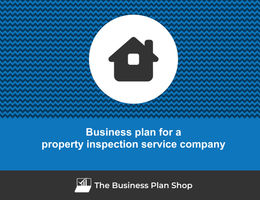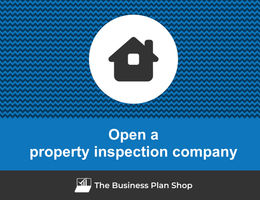How to create a financial forecast for a property inspection company?
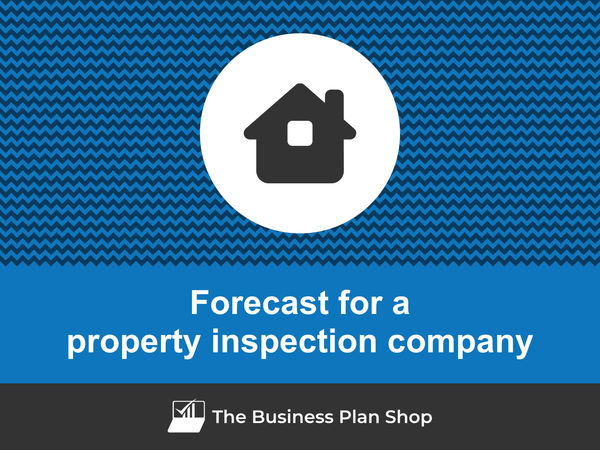
Developing and maintaining an up-to-date financial forecast for your property inspection company is key in order to maintain visibility on your business’s future cash flows.
If you feel overwhelmed at the thought of putting together a property inspection company financial forecast then don’t worry as this guide is here to help you.
We'll cover everything from: the main objectives of a financial forecast, the data you need to gather before starting, to the tables that compose it, and the tools that will help you create and maintain your forecast efficiently.
Let's get started!
Why create and maintain a financial forecast for a property inspection company?
In order to prosper, your business needs to have visibility on what lies ahead and the right financial resources to grow. This is where having a financial forecast for your property inspection company becomes handy.
Creating a property inspection company financial forecast forces you to take stock of where your business stands and where you want it to go.
Once you have clarity on the destination, you will need to draw up a plan to get there and assess what it means in terms of future profitability and cash flows for your property inspection company.
Having this clear plan in place will give you the confidence needed to move forward with your business’s development.
Having an up-to-date financial forecast for a property inspection company is also useful if your trading environment worsens, as the forecast enables you to adjust to your new market conditions and anticipate any potential cash shortfall.
Finally, your property inspection company's financial projections will also help you secure financing, as banks and investors alike will want to see accurate projections before agreeing to finance your business.
Need a convincing business plan?
The Business Plan Shop makes it easy to create a financial forecast to assess the potential profitability of your projects, and write a business plan that’ll wow investors.

What information is needed to build a property inspection company financial forecast?
The quality of your inputs is key when it comes to financial modelling: no matter how good the model is, if your inputs are off, so will the forecast.
If you are building a financial plan to start a property inspection company, you will need to have done your market research and have a clear picture of your sales and marketing strategies so that you can project revenues with confidence.
You will also need to have a clear idea of what resources will be required to operate the property inspection company on a daily basis, and to have done your research with regard to the equipment needed to launch your venture (see further down this guide).
If you are creating a financial forecast of an existing property inspection company, things are usually simpler as you will be able to use your historical accounting data as a budgeting base, and complement that with your team’s view on what lies ahead for the years to come.
Let's now zoom in on what will go in your property inspection company's financial forecast.
The sales forecast for a property inspection company
The sales forecast, also called topline projection, is normally where you will start when building your property inspection company financial forecast.
Creating a coherent sales projection boils down to estimating two key drivers:
- The average price
- The number of monthly transactions
To do this, you will need to rely on historical data (for an existing business), market research data (for both new and existing property inspection companies), and consider the elements below:
- Number of properties sold in the market: The number of properties sold in the market can directly impact your business's average price and number of monthly transactions. When the real estate market is slow, there may be a decrease in the number of properties that require inspection, resulting in a lower average price and fewer monthly transactions for your company.
- Housing market trends: Changes in housing market trends, such as an increase in demand for certain types of properties or a shift towards eco-friendly homes, can affect your business's average price. For example, if there is a growing demand for energy-efficient homes, you may be able to charge a higher price for inspections with green certifications.
- Competition: The presence of competitors in your area can also affect your business's average price and number of monthly transactions. If there are many property inspection companies in your area, you may need to adjust your prices to remain competitive. This could result in a lower average price and potentially more monthly transactions as customers may be drawn to your lower prices.
- Economic conditions: Economic conditions, such as interest rates or unemployment rates, can indirectly affect your business's average price and number of monthly transactions. For instance, during a recession, people may be less likely to buy or sell properties, leading to a decrease in demand for property inspections and potentially lower prices.
- New construction projects: The number of new construction projects in your area can also impact your business's average price and number of monthly transactions. When there is a high demand for new homes, there may be an increase in the need for property inspections, resulting in a higher average price and more monthly transactions for your company.
After the sales forecast comes the operating expenses budget, which we will now look into in more detail.
Need a convincing business plan?
The Business Plan Shop makes it easy to create a financial forecast to assess the potential profitability of your projects, and write a business plan that’ll wow investors.

The operating expenses for a property inspection company
The next step is to estimate the expenses needed to run your property inspection company on a day-to-day basis.
These will vary based on the level of sales expected, and the location and size of your business.
But your property inspection company's operating expenses should include the following items at a minimum:
- Staff costs: This includes salaries, benefits, and any other expenses related to hiring and maintaining a team of property inspectors.
- Accountancy fees: As a property inspection company, you may need to hire an accountant to handle your finances, taxes, and other financial matters.
- Insurance costs: It is important to have insurance coverage for your business, including general liability, professional liability, and workers' compensation insurance.
- Software licences: You may need to invest in software licences for inspection software, accounting software, and other programs that are essential for your business operations.
- Banking fees: This includes charges for maintaining a business bank account, transaction fees, and other banking-related expenses.
- Marketing and advertising: To attract clients and promote your services, you may need to invest in marketing and advertising efforts, such as creating a website, printing business cards, and running online ads.
- Office rent: If you have a physical office space, you will need to include rent or lease expenses in your operating costs.
- Office supplies: This includes expenses for office equipment, stationary, and other supplies that are necessary for running your business.
- Travel expenses: As a property inspection company, you may need to travel to different locations for inspections. This includes expenses for transportation, accommodation, and meals.
- Training and development: To ensure your team is up-to-date with the latest inspection techniques and regulations, you may need to invest in training and development programs.
- Vehicle expenses: If your company uses vehicles for inspections, you will need to include expenses for fuel, maintenance, and insurance.
- Telephone and internet: These are essential communication tools for your business and should be included in your operating expenses.
- Office utilities: This includes expenses for electricity, water, and other utilities needed to operate your office.
- Legal fees: You may need to consult with a lawyer for contracts, legal documents, and other legal matters related to your business.
- Professional memberships: As a property inspection company, you may need to join professional organizations and pay membership fees to stay updated with industry news and regulations.
This list is, of course, not exhaustive, and you'll have to adapt it according to your precise business model and size. A small property inspection company might not have the same level of expenditure as a larger one, for example.
What investments are needed to start or grow a property inspection company?
Once you have an idea of how much sales you could achieve and what it will cost to run your property inspection company, it is time to look into the equipment required to launch or expand the activity.
For a property inspection company, capital expenditures and initial working capital items could include:
- Inspection Equipment: This includes items such as moisture meters, thermal imaging cameras, and radon detection kits. These are essential tools for conducting thorough property inspections and ensuring accurate results.
- Vehicle: As a property inspection company, you will need a reliable vehicle to travel to different properties. This could include a van or truck to transport equipment and supplies, or a car for smaller inspections. Consider the size, fuel efficiency, and maintenance costs when choosing a vehicle.
- Office Equipment: In addition to equipment used for inspections, you will also need basic office equipment such as computers, printers, and filing cabinets. These items are necessary for day-to-day operations and organizing inspection reports and paperwork.
- Software: Property inspection companies often use specialized software to manage appointments, create reports, and store data. This can include scheduling software, accounting software, and reporting software. Consider the cost of licenses and any ongoing maintenance fees.
- Safety Gear: As a property inspector, you may be exposed to hazardous materials or dangerous situations. It is important to invest in proper safety gear such as hard hats, gloves, masks, and protective clothing to ensure the safety of yourself and your team.
Again, this list will need to be adjusted according to the specificities of your property inspection company.
Need a convincing business plan?
The Business Plan Shop makes it easy to create a financial forecast to assess the potential profitability of your projects, and write a business plan that’ll wow investors.

The financing plan of your property inspection company
The next step in the creation of your financial forecast for your property inspection company is to think about how you might finance your business.
You will have to assess how much capital will come from shareholders (equity) and how much can be secured through banks.
Bank loans will have to be modelled so that you can separate the interest expenses from the repayments of principal, and include all this data in your forecast.
Issuing share capital and obtaining a bank loan are two of the most common ways that entrepreneurs finance their businesses.
What tables compose the financial plan for a property inspection company?
Now let's have a look at the main output tables of your property inspection company's financial forecast.
The profit & loss forecast
The forecasted profit & loss statement will enable you to visualise your property inspection company's expected growth and profitability over the next three to five years.
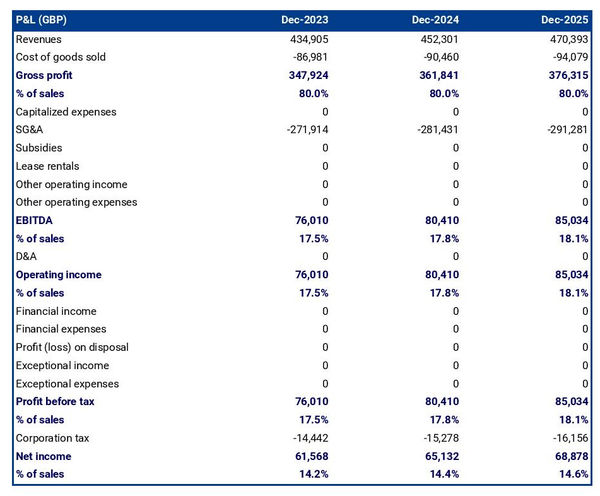
A financially viable P&L statement for a property inspection company should normally show:
- Sales growing above inflation
- Stable or expanding (ideally) profit margins
- A net profit
This will of course depend on the stage of your business: a new venture might be loss-making until it reaches its breakeven point in year 2 or 3, for example.
The projected balance sheet
The projected balance sheet gives an overview of your property inspection company's financial structure at the end of the financial year.
It is composed of three categories of items: assets, liabilities and equity:
- Assets: are what the business possesses and uses to produce cash flows. It includes resources such as cash, buildings, equipment, and accounts receivable (money owed by clients).
- Liabilities: are the debts of your property inspection company. They include accounts payable (money owed to suppliers), taxes due and bank loans.
- Equity: is the combination of what has been invested by the business owners and the cumulative profits to date (which are called retained earnings). Equity is a proxy for the value of the owner's stake in the business.
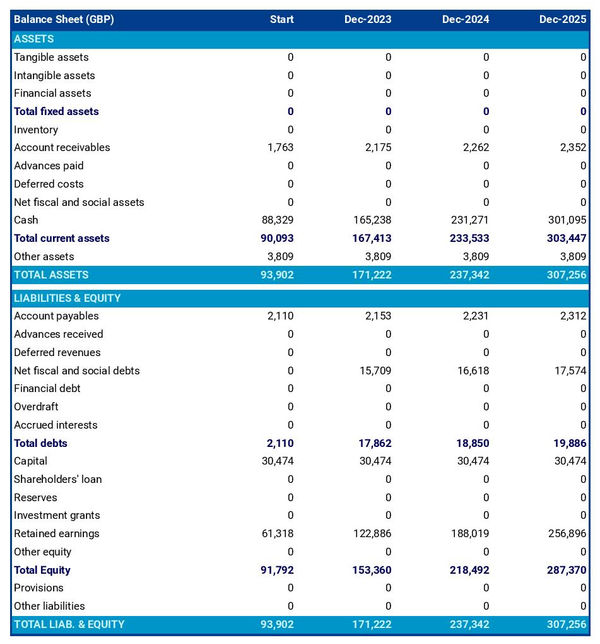
The cash flow projection
The cash flow forecast of your property inspection company will show how much cash the business is expected to generate or consume over the next three to five years.
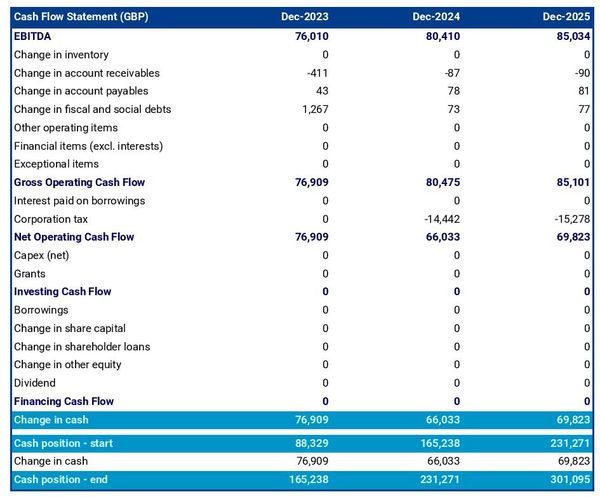
There are multiple ways of presenting a cash flow forecast but from experience, it is better to organise it by nature in order to clearly show these elements:
- Operating cash flow: how much cash is generated by the property inspection company's operations
- Investing cash flow: what is the business investing to expand or maintain its equipment
- Financing cash flow: is the business raising additional funds or repaying financiers (debt repayment, dividends)
Your cash flow forecast is the most important element of your overall financial projection and that’s where you should focus your attention to ensure that your property inspection company is adequately funded.
Note: if you are preparing a financial forecast in order to try to secure funding, you will need to include both a yearly and monthly cash flow forecast in your property inspection company's financial plan.
Need a convincing business plan?
The Business Plan Shop makes it easy to create a financial forecast to assess the potential profitability of your projects, and write a business plan that’ll wow investors.

Which tool should you use to create your property inspection company's financial forecast?
Using the right tool or solution will make the creation of your property inspection company's financial forecast much easier than it sounds. Let’s explore the main options.
Using online financial forecasting software to build your property inspection company's projections
The modern and easiest way is to use an online financial forecasting tool such as the one we offer at The Business Plan Shop.
There are several advantages to using specialised software:
- You can easily create your financial forecast by letting the software take care of the financial calculations for you without errors
- You have access to complete financial forecast templates
- You get a complete financial forecast ready to be sent to your bank or investors
- You can easily track your actual financial performance against your financial forecast, and recalibrate your forecast as the year goes by
- You can create scenarios to stress test your forecast's main assumptions
- You can easily update your forecast as time goes by to maintain visibility on future cash flows
- You have a friendly support team on standby to assist you when you are stuck
- It’s cost-efficient and much cheaper than using an accountant or consultant (see below)
If you are interested in this type of solution, you can try our projection software for free by signing up here.
Calling in a financial consultant or chartered accountant
Outsourcing the creation of your property inspection company financial forecast is another possible solution.
This will cost more than using software as you can expect as your price will have to cover the accountant’s time, software cost, and profit margin.
Price can vary greatly based on the complexity of your business. For a small business, from experience, a simple three-year financial forecast (including a balance sheet, income statement, and cash flow statement) will start at around £700 or $1,000.
Bear in mind that this is for forecasts produced at a single point in time, updating or tracking your forecast against actuals will cost extra.
If you decide to outsource your forecasting:
- Make sure the professional has direct experience in your industry and is able to challenge your assumptions constructively.
- Steer away from consultants using sectorial ratios to build their client’s financial forecasts (these projections are worthless for a small business).
Why not use a spreadsheet such as Excel or Google Sheets to build your property inspection company's financial forecast?
You and your financial partners need numbers you can trust. Unless you have studied finance or accounting, creating a trustworthy and error-free property inspection company financial forecast on a spreadsheet is likely to prove challenging.
Financial modelling is very technical by nature and requires a solid grasp of accounting principles to be done without errors. This means that using spreadsheet software like Excel or Google Sheets to create accurate financial forecasts is out of reach for most business owners.
Creating forecasts in Excel is also inefficient nowadays:
- Software has advanced to the point where forecasting can be done much faster and more accurately than manually on a spreadsheet.
- With artificial intelligence, the software is capable of detecting mistakes and helping decision-making.
Spreadsheets are versatile tools but they are not tailor-made for reporting. Importing your property inspection company's accounting data in Excel to track actual vs. forecast is incredibly manual and tedious (and so is keeping forecasts up to date). It is much faster to use dedicated financial planning tools like The Business Plan Shop which are built specially for this.
Need a convincing business plan?
The Business Plan Shop makes it easy to create a financial forecast to assess the potential profitability of your projects, and write a business plan that’ll wow investors.

Use our financial forecast templates for inspiration
The Business Plan Shop has dozens of financial forecast examples available.
Our templates contain both a financial forecast and a written business plan which presents, in detail, the company, the team, the strategy, and the medium-term objectives.
Our templates are a great source of inspiration, whether you just want to see what a complete business plan looks like, or are looking for concrete examples of how you should model financial elements in your own forecast.
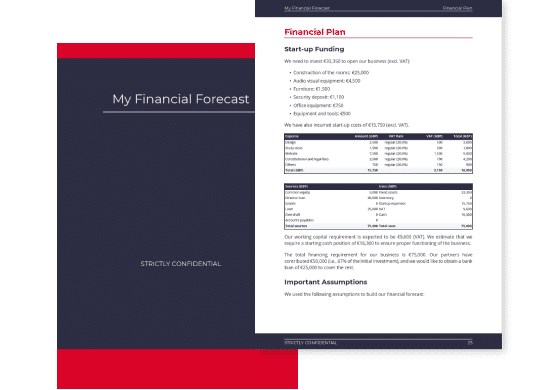
Takeaways
- A financial forecast shows expected growth, profitability, and cash generation metrics for your property inspection company.
- Tracking actuals vs. forecast and having an up-to-date financial forecast is key to maintaining visibility on your future cash flows.
- Using financial forecasting software is the modern way of creating and maintaining financial projections.
We hope that this guide helped you gain a clearer perspective on the steps needed to create the financial forecast for a property inspection company. Don't hesitate to contact us if you have any questions!
Need a convincing business plan?
The Business Plan Shop makes it easy to create a financial forecast to assess the potential profitability of your projects, and write a business plan that’ll wow investors.

Also on The Business Plan Shop
- Financial forecast example
- How to project revenues for a business?
- Example of financial forecast for business idea
Know someone who runs a property inspection company? Share our business guide with them!


